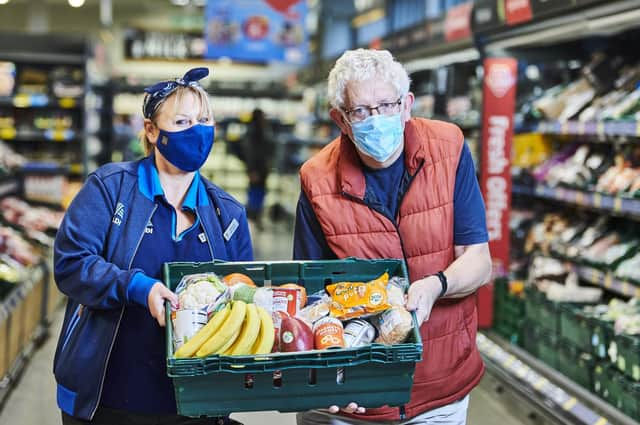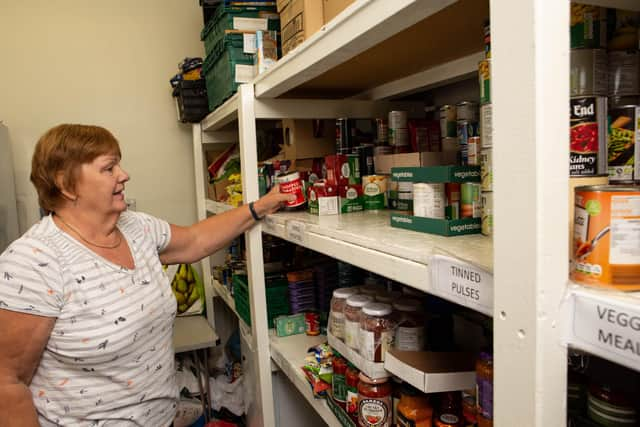How to save on food costs by shopping seasonally as cost of living crisis bites and leaves Rishi Sunak vulnerable – Jayne Dowle


I very much doubt that he does. When was the last time Mr S cooked a meal from scratch, I wonder? Or went round the supermarket mentally totting up the cost of everything he needed to put in his shopping trolley, to make sure he had enough funds?
I’ve heard one recent tale of a husband sent into the supermarket by his wife to buy a leg of lamb for the Sunday dinner. She was expecting him to pay around £15-£16, but he came out proudly bearing a joint that cost almost £30. Aghast at the doubling of her expectations, she told him to take it back inside and demand his money back.
Advertisement
Hide AdAdvertisement
Hide AdAs far as I know, he refused, but this illustrates a very real fact of life. For years now, finding enough money for food has been someone else’s problem.


We know that food bank usage has sky-rocketed since austerity measures were introduced under David Cameron’s auspices in 2010. The Trussell Trust charity notes a 41-fold increase in use over the last decade – up from 61,468 users in 2010-11 to 2.5 million users in 2020-21.
However, there is a stark difference between people in difficult circumstances who can’t afford food, and those who are working and relatively secure but now finding prices increasingly beyond their reach.
Unless you have the kind of limitless funds that mean you never check a receipt, you can’t help but notice that everything is going up.
Advertisement
Hide AdAdvertisement
Hide AdHanding out up to £350 per household, including £150 off council tax bills for properties in Bands A to D “to help the poorest families” as Sunak likes to remind us, is hardly going to help people make ends meet for the rest of the year. Or for the foreseeable future as John Allan, chairman of Tesco, warns that “the worst is yet to come”.


Already, the price of pasta has risen by 15 per cent, cooking oil has gone up by 16 per cent and margarine has soared by 37 per cent in the year to January, according to official figures from the Office for National Statistics.
Mr Allan, defending Tesco against claims from food poverty activist Jack Monroe that the cost of basic staples was rising faster than other goods, estimated that supermarket prices could go up by as much as five per cent by the spring as increasing energy and other costs hit.
“We are impacted by rising energy prices, our suppliers are impacted by rising energy prices. So the likelihood is that that inflation figure will rise,” he said.
Advertisement
Hide AdAdvertisement
Hide Ad“Something must be done”, we all agree, but the Chancellor simply hasn’t got the power to prevent supermarkets from raising their prices if they so wish.
He could curb energy costs, including a windfall tax – supported by Labour – on fuel companies. However, this would address just one element. The rising cost of food in the UK is determined by a series of global forces beyond the control of the British government. Supply problems and higher shipping costs are huge factors putting pressure on businesses.
With all this as the backdrop, we must consider how far political intervention should go before personal responsibility takes over. Hard as it is to stomach, part of the problem is our laissez-faire attitude to food shopping.
We might remember the credit crunch in 2008, but this barely dented day-to-day costs for long. It was the 1990s when the cost of living was this high and many of us can’t remember with clarity what it felt like for prices of ordinary goods to spriral so out of control.
Advertisement
Hide AdAdvertisement
Hide AdIt might be difficult to keep this context in mind when we’re shaking our heads in disbelief at the supermarket, but we must.
There are things that the Government can do, but there is also only so much that it can do. If we’re to survive this, we must become more resourceful and imaginative. Our reliance on easy solutions to the age-old question of “what to have for supper?” is going to take a battering, so batten down the hatches.
With only an O-level in Home Economics, I’m hardly best-placed to advise on actual cooking under budgetary constraints – and I would recommend Jack Monroe’s book Cooking on a Bootstrap here – but some advice I would share is that careful meal-planning, cutting out waste (no-one needs that many biscuits), banning constant grazing from the fridge by simply not buying snacks, batch-cooking and freezing in bulk instead of ready-made meals can all help keep costs down.
Shopping locally and seasonally helps too, of course, getting to know shopkeepers and not paying for expensive imported produce. And remember one final thing. If you’re buying a leg of lamb, always check the label before you reach the till.
Advertisement
Hide AdAdvertisement
Hide AdSupport The Yorkshire Post and become a subscriber today. Your subscription will help us to continue to bring quality news to the people of Yorkshire. In return, you’ll see fewer ads on site, get free access to our app, receive exclusive members-only offers and access to all premium content and columns. Click here to subscribe.
Comment Guidelines
National World encourages reader discussion on our stories. User feedback, insights and back-and-forth exchanges add a rich layer of context to reporting. Please review our Community Guidelines before commenting.